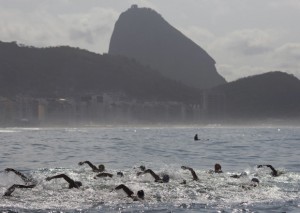The upcoming 2016 Summer Olympics will be held in Rio de Janiero (Rio). Brazil is the first South American country to host the Olympic games. However, currently, the sanitation state of the city is creating major concern as it may interfere with the athlete’s safety to compete in some sporting events. Brazil has been facing sanitation issues with their water for many years now. Currently, the waters in which sporting activities will take place are filled with human feces and garbage putting athletes at a huge risk of illness and attracting infectious diseases such as norovirus or hepatitis A virus (HAV). 10,000 athletes and thousands of tourists will be gathering in Rio to take part in the Olympics next August. 1,400 of these athletes will be competing in sports such as rowing, canoeing, sailing, triathlons and long distance swimming, all of which will be experiencing high exposure to the contaminated waters.
An Associated Press (AP) analysis of the water quality from three Olympic sites was performed and revealed extremely dangerous levels of both viruses and bacteria. The test results showed that the virus and bacterial levels present in the water are 1.7 million times higher than what is considered a hazardous level in North America. The contamination is a result of household waste and sewage, which is unfiltered before entering the water streams. As the viruses present have low infectious doses, the concern for individual safety is on the rise.
An expert in risk assessment for waterborne viruses analyzed the results from the AP testing and estimated that athletes from around the world who are not commonly exposed to these viruses have a 99% chance of being infected by a virus via the consumption of only 3 tablespoons of water. This can cause severe sickness such as gastroenteritis, vomiting, and diarrhea. Furthermore, both viruses are easily spread from person to person creating the risk for large amounts of illnesses during this world event.
The major concern is for the athletes and the many tourists who will be gathering to watch the Olympic events. Both of these viruses are very easily attracted and spread. As such, the outcome of unsanitary waters could be catastrophic. Although Brazil committed to cleaning their water when they were selected to host the 2016 summer games, little improvement has been shown so far. Concerns have risen as now the games are less than one year away and little progress has been made. All individuals travelling to the games have been advised to receive heptatis A vaccinations however, little can be done about the prevention of norovirus. Therefore, the key solution to this issue is to clean up the waters by bringing the bacterial and viral levels down to a minimum.
Sources:
Associated Press (2015, July 30). Olympic athletes to swim and boat in “raw sewage”. CBC news. Retrieved from http://www.cbsnews.com/news/brazil-summer-olympics-water-contaminated-with-raw-sewage/
Brooks, B., Barchfield, J. (2015, July 30). AP Investigation: Olympic teams to swim, boat in Rio’s filth. Retrieved from http://bigstory.ap.org/article/d92f6af5121f49d982601a657d745e95/ap-investigation-rios-olympic-water-rife-sewage-virus
Centers for Disease Control and Prevention (2011, March 4). Updated Norovirus Outbreak Management and Disease Prevention Guidelines. Retrieved from http://www.cdc.gov/mmwr/preview/mmwrhtml/rr6003a1.htm
Hepatitis News (2015, August 21). Hepatitis A Concern fors for 2016 Summer Olympics in Brazil. Retrieved from http://www.hepmag.com/articles/hav_concerns_olympics_2831_27670.shtml
World Health Organization (2015, July). Hepatits A. Retrieved from http://www.who.int/mediacentre/factsheets/fs328/en/


